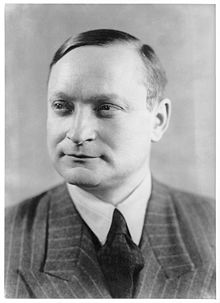Georg Leibbrandt
| Georg Leibbrandt | |
|---|---|
 |
|
| Head of the Eastern Division of the Foreign Policy Office of the NSDAP (Reichsamtsleiter) | |
|
In office 1933–1945 |
|
| Preceded by | Position established |
| Succeeded by | None |
| Undersecretary in the Reich Ministry for the Occupied Eastern Territories | |
|
In office 1941–1943 |
|
| Preceded by | Position established |
| Succeeded by | Gottlob Berger |
| Personal details | |
| Born |
6 September 1899 Hoffnungstal, Kherson Governorate, Russian Empire |
| Died | 16 June 1982 (aged 82) Bonn, Federal Republic of Germany |
| Nationality | German |
| Political party | National Socialist German Workers' Party (NSDAP) |
| Profession | Diplomat, scholar |
Georg Leibbrandt (6 September 1899 – 16 June 1982) was a Nazi German bureaucrat and diplomat. He occupied leading foreign policy positions in the Nazi Party Foreign Policy Office (APA) and the Reich Ministry for the Occupied Eastern Territories (RMfdbO) as an expert on issues relating to Russia. Both agencies were headed by Nazi ideologist Alfred Rosenberg. Leibbrandt was a participant of the Wannsee Conference. In the postwar period, criminal proceedings against Leibbrandt were initiated, but the case against him was ultimately dismissed.
Leibbrandt was born to ethnic German parents in Tsebrykove (also called in German: Hoffnungsthal), near Odessa, in the Zebrikovo district of the Kherson Governorate of the Russian Empire. At an early age he emigrated to Germany for his studies.
In 1918, Leibbrandt studied theology in Germany, also taking classes in philology and history. In 1927, he was awarded a Ph.D. He traveled extensively through the Soviet Union in 1926, 1928 and 1929. During his visits, he was variously represented as a doctor of philosophy, a post-graduate student, a professor of history from Leipzig University, and an employee of the Institute for the Study of Germans Abroad (Deutsches Ausland Institute) in Stuttgart. The official purposes of his visits were the study of the history of the development of German colonies in the Black Sea coastal region, and the gathering of historical information. As a result of his work, a book regarding emigrant movement of the Germans was published in Germany.
...
Wikipedia
